

Switchback Travel (Chris Carter)


Switchback Travel (Chris Carter)
Price: $199
Weight: 2 lb. 11 oz. (women’s small)
Fabric: Ripstop nylon
Capacity: 55L
What we like: Great carrying comfort even with a full load; competitively lightweight and affordably priced.
What we don’t: Shoulder strap pocket is prone to falling off; no secondary access to the main compartment.
See the Women's REI Co-op Flash 55 See the Men's REI Co-op Flash 55
REI Co-op’s in-house line of gear consistently strikes a great balance between price and performance. Their Flash 55 pack is no exception, combining impressive carrying comfort and generous organization in a competitively light and affordably priced package. We took the women’s version to Wyoming’s Wind River Range for testing, where it proved to be a very capable companion during a three-day loop through the dramatic Cirque of the Towers. There are some downsides to the design—including a flimsy shoulder strap pocket and single entry to the main compartment—but overall, the Flash is a very well-rounded performer for the price. Below are my thoughts on the women’s Flash 55. To see how it stacks up to the competition, check out our articles on the best women's backpacking backpacks, best backpacking backpacks, and best ultralight backpacks.
My first backpack—which I rocked for years—was a cushy Osprey design, so I have high expectations when it comes to carrying comfort. Surprisingly, the lightweight REI Co-op Flash 55 delivered in spades. The shoulder straps, backpanel, and hipbelt are all well padded with moderately thick foam that does a great job preventing pressure points and keeping the load evenly balanced. Despite approaching the pack’s 35-pound weight limit during a trip to the Wind River Range in Wyoming, I had no issues throughout very full days on the trail, and it was easy to dial in a good fit with the quick and intuitive torso adjustment system (more in “Fit and Sizing” below). The full-perimeter metal frame certainly helps, lending a good amount of structure and support.

It’s worth noting that our male tester found the shoulder straps to be noisy, resulting in a sandpaper rubbing-like sound when compressed. He also reported the backpanel protruding at the shoulders due to the torso adjustment system, which resulted in a bit of pressure in this area (you can see his full review of the men's Flash 55 here). I didn’t experience either of these issues—the padding was quiet, and the backpanel sat flush against my shoulder blades with no protrusion—but it may come down to sizing and how the pack fits your body. If possible, I’d recommend trying the Flash on before you buy to ensure it will work for you.

At 2 pounds 11 ounces in a women’s small, the REI Flash 55 is competitively lightweight but not overly compromised like some ultra-streamlined UL designs. For comparison, it’s right in line with popular packs like the Osprey Eja 58 (2 lb. 11.5 oz. in a size XS/S) and Gregory’s Facet 55 (2 lb. 8.8 oz. for a women’s small) while checking in considerably lighter than more traditional options like the Osprey Aura AG LT 65 (3 lb. 13.4 oz.). Even the Aura AG LT 50, which offers a little less capacity than the Flash, clocks in at a fairly hefty 3 pounds 12.7 ounces. To be sure, you can squeeze under the 2-pound mark with a more targeted ultralight design like the Hyperlite Southwest 55 (1 lb. 15.7 oz.) or Zpacks’ feathery Arc Haul Ultra 60L (1 lb. 4.3 oz.), but those packs make noteworthy compromises in organization (and ventilation, in the case of the Southwest). Comparisons aside, I feel REI did an excellent job balancing weight and all-around performance with the Flash 55.

Organization isn’t often a strong suit among ultralight designs, but the well-appointed Flash 55 is a notable exception. Starting at the top, you get a sizable lid with a single zippered compartment on top. I did find myself wishing for another pocket underneath the lid for divvying up items like sunscreen, lip balm, and smaller electronics, but it wasn’t a dealbreaker by any means, and the fact that the lid can be detached for use around camp is a nice feature. You also get a spacious shove-it pocket at the front with stretchy mesh running along either side—perfect for stashing a rain shell. Each side features two pockets: a tall pocket that’s made with ripstop nylon for protecting items like trekking poles or a tent, as well as a mesh water bottle pocket that’s angled to make on-the-go hydration quick and easy.
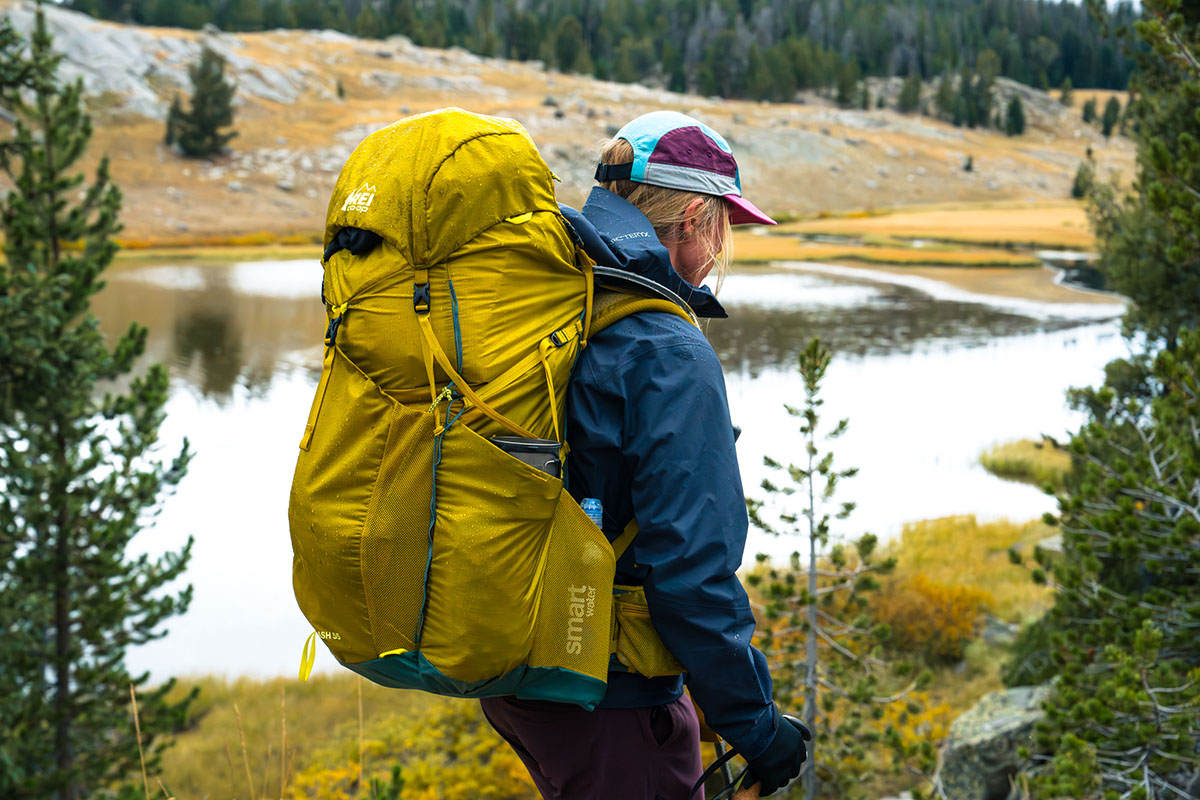
Three of the Flash 55’s pockets—part of REI's unique Packmod system—are removable: the dual hipbelt pockets (one mesh and one ripstop nylon), both of which are smartphone-friendly, as well as the shoulder strap pocket. This latter pocket was my least favorite: It was a very tight squeeze for my iPhone 13 in its case, requiring me to remove the case for easy access. With my phone inside, the pocket had a very floppy feel and moved around a lot while I was backpacking. And when I bent over, it was prone to catching and falling off the pack, which happened several times during our three-day trip. Reattaching it was an exercise in patience: I either had to remove the pack fully or ask for help given the awkward angle. Ultimately, I ended up removing the pocket and stashing my phone in one of the hipbelt pockets instead.
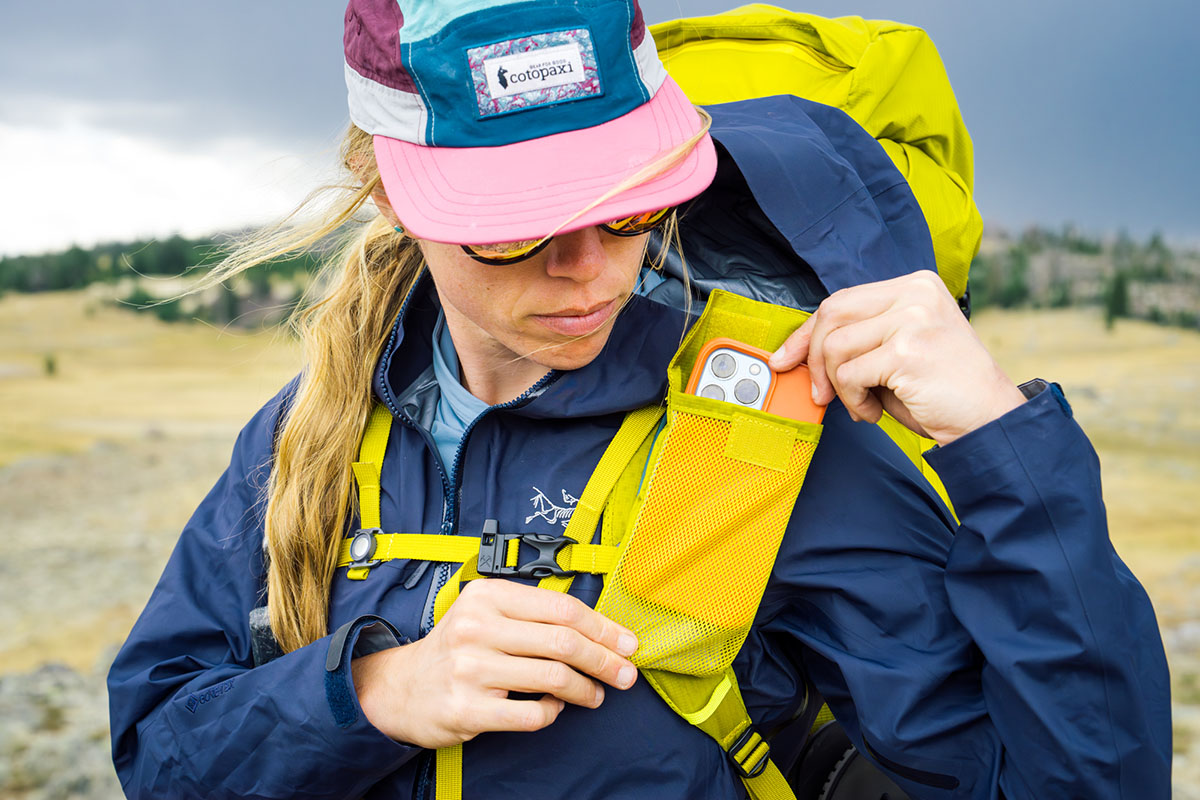
Rounding out the storage layout is a cavernous main compartment with a sleeve at the back that can accommodate a 3-liter hydration reservoir (not included). There’s are two ports for routing the tube over either shoulder, along with a magnetic attachment point on the sternum strap for keeping it out of your way while hiking. I do wish the pack featured a zipper along the front for quickly accessing the main compartment—with the standard roll-top opening, it can be tough to retrieve items at the bottom of the pack without removing all of your gear—but I understand REI’s decision to omit this feature given the potential weight penalty.
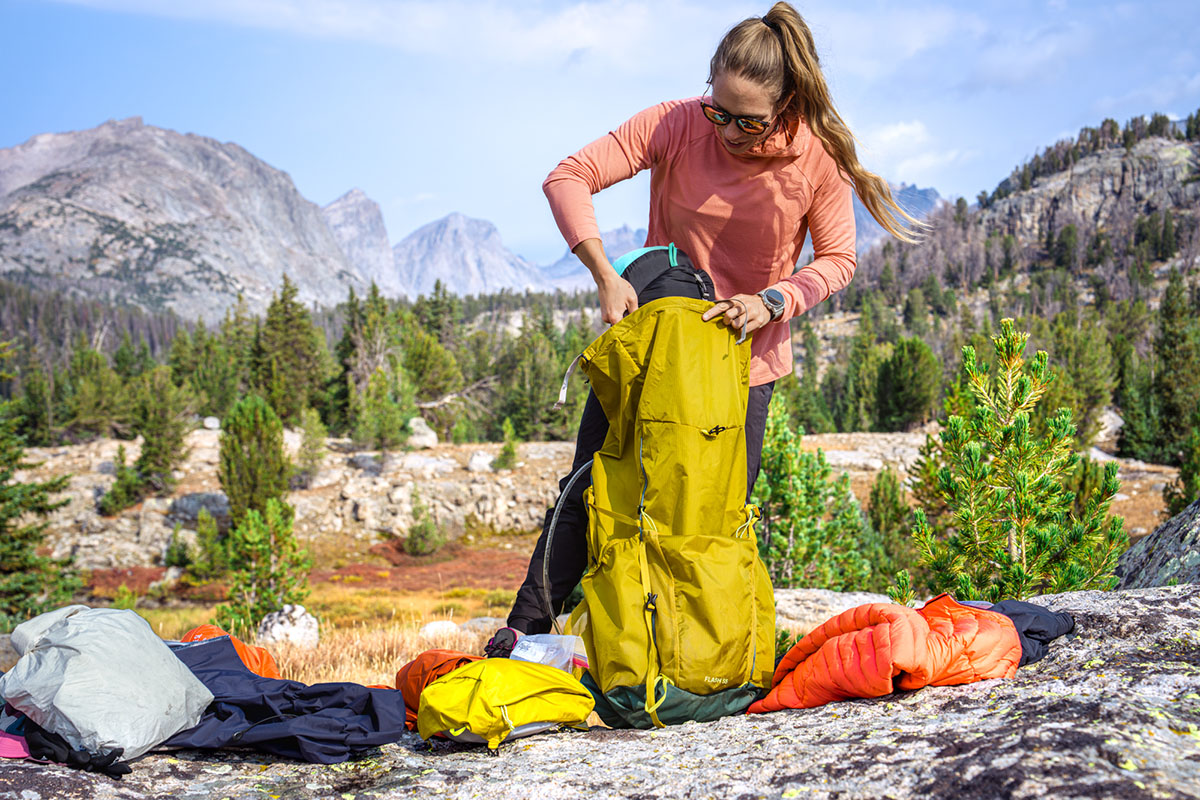
As I mentioned, the REI Co-op Flash 55 features a fairly standard roll-top closure that allows you to compress the pack down to fit the size of your load. The Flash’s collar, in particular, extends quite far, allowing plenty of space for bulky gear, and it’s easy to snug things down on less gear-intensive trips. The design is pretty intuitive: Simply roll and buckle the roll-top, then adjust and tighten the lid using two buckles along the front mesh pocket. If you choose to forego the lid, you can secure the roll-top the same way—the buckles are all the same, so there are several options for configuration.
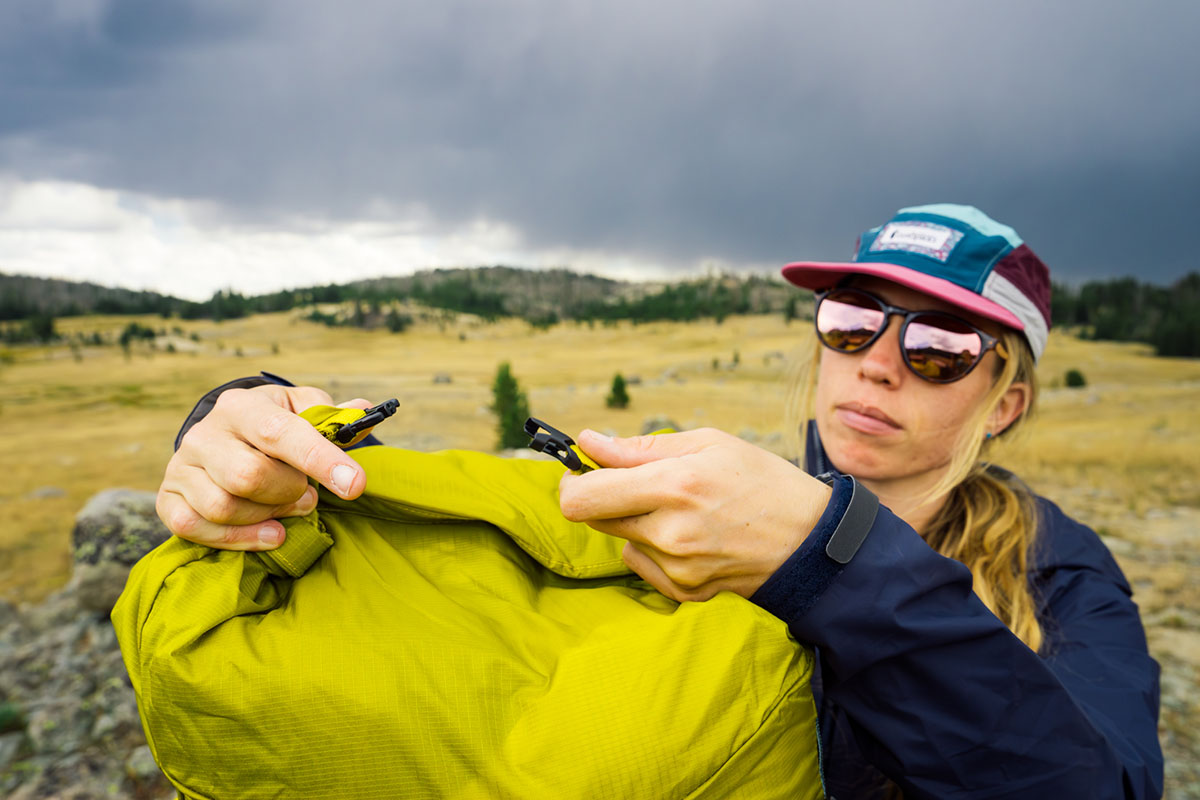
In addition to the multiple closure options, the Flash 55 features four compression straps (also part of the Packmod system) for securing gear externally. Depending on what you’re carrying, the straps can be moved up or down along daisy chains at the sides of the pack or left behind to cut weight. Further, REI included an ice axe attachment loop at the bottom of the pack and a bungee cord along the top to secure it. Taken together, it’s a well-executed system that’s easy to customize and never left me wanting more.

Like most ultralight backpacks, the Flash 55 does make some sacrifices in the durability department to keep weight low, but I don’t feel REI went overboard. While REI doesn’t list the fabric thickness (designated by a denier specification), the Flash has a decently hardwearing feel with abrasion-resistant ripstop nylon covering most of the pack. Mesh is used sparingly but effectively, with no snags or tears despite frequent contact with rock during our trip to Wyoming. My only real concern relates to the buckles and straps, all of which have a fairly delicate and flimsy feel. To be fair, I haven’t had any issues yet, but I won’t be surprised if they fail over time. Treating the pack with care and taking your time when making adjustments should help extend the Flash’s lifespan.
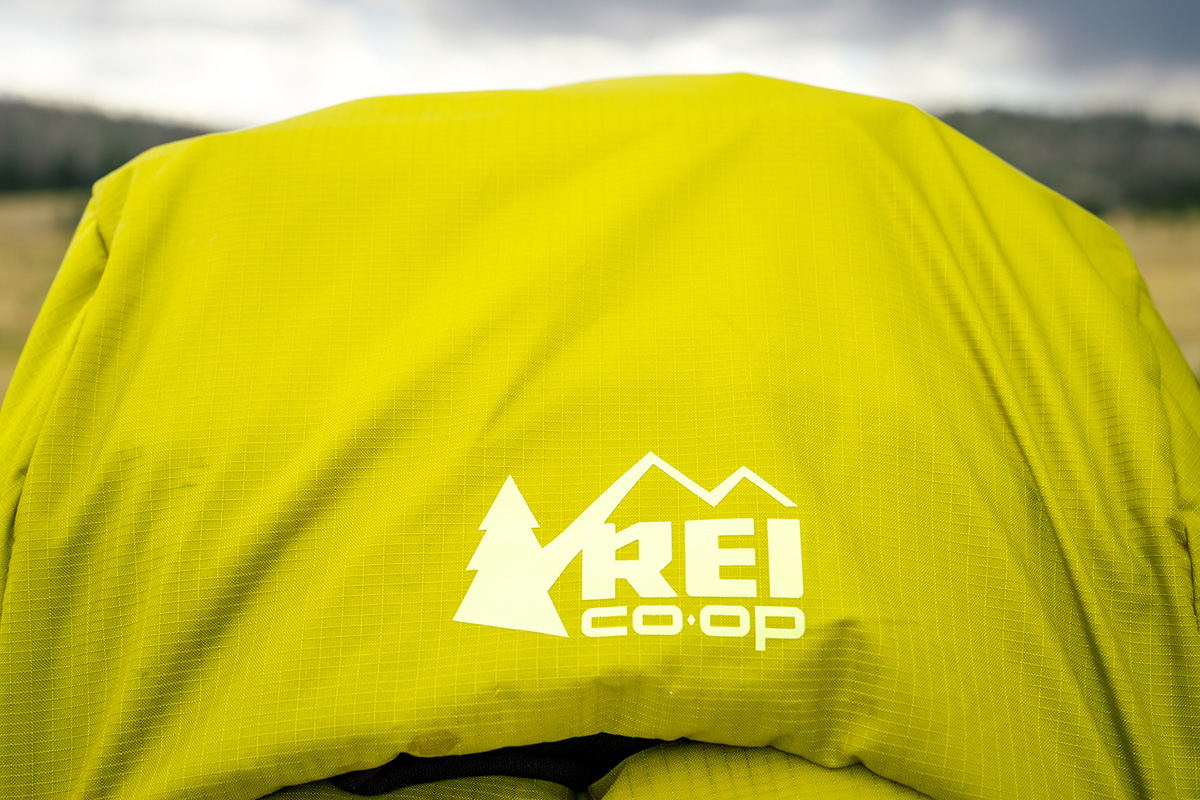
Ventilation is one area where I feel the REI Flash 55 falls a little short. While very comfortable, the foam-heavy backpanel doesn’t do a stellar job promoting airflow, leading to a sweaty back after one particularly steep climb in the Winds. Temperatures were very mild, and I don’t typically run warm and rarely experience overheating while backpacking. If breathability is important to you, it’s worth considering a suspended mesh design, with Osprey designs consistently leading the way. The Eja 58 is one standout, with a well-ventilated AirSpeed suspension system that creates a nice gap between the pack and your back.
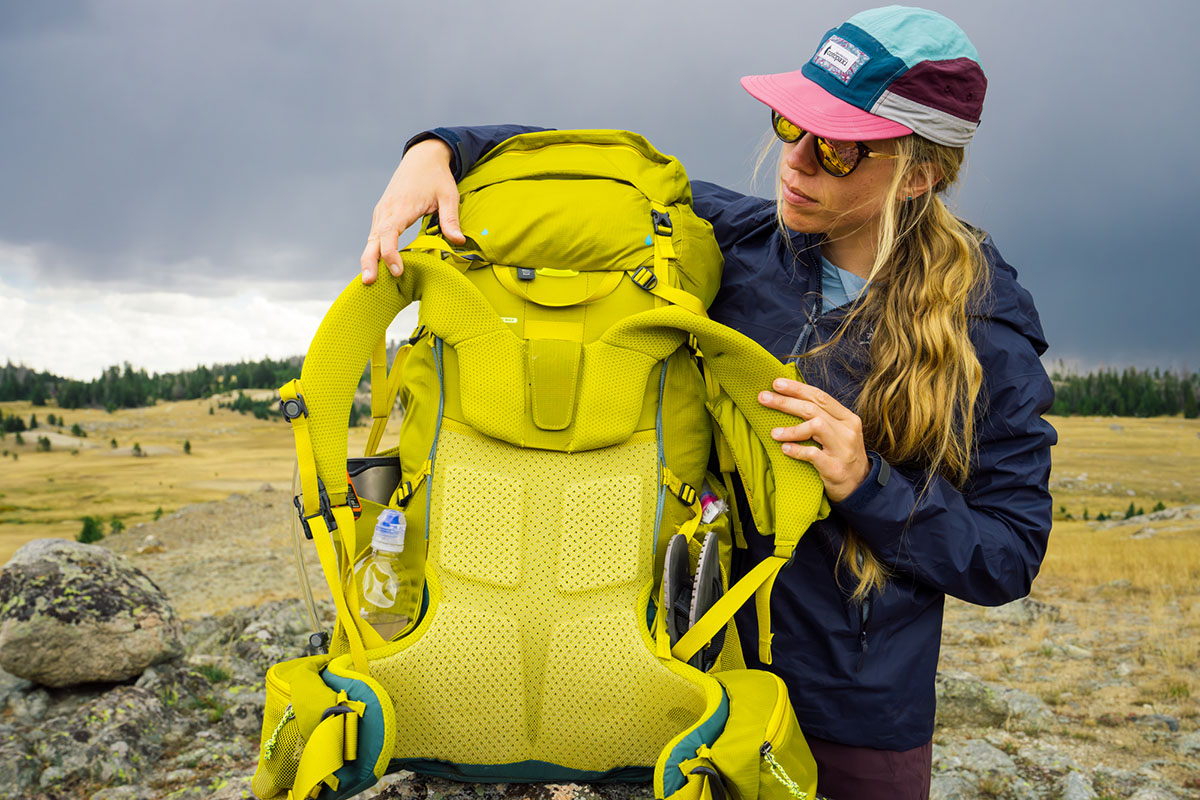
I opted for my usual women’s size small in the REI Co-op Flash 55 and was happy with my choice. With just a little tweaking, I was able to dial in a great all-around fit with no pressure points or areas of concern. The hook-and-loop adjustment system makes it easy to fine-tune the shoulder strap placement, with the size small fitting torsos from 16 to 18 inches (I’m right in the middle at 17 in.). The waist is also adjustable from 32 to 40 inches, although the hipbelt is fixed in place. In terms of sizing, REI offers the pack in standard extra small, small, and medium sizes, along with a unique extra-small torso and medium hipbelt combination for accommodating a wider range of body types.

REI is known for their environmentally conscious ethos, and the Flash 55 is another sustainably built design from the co-op. Specifically, the pack is made with recycled nylon that’s also bluesign-approved. This means the fabric meets strict environmental and health standards and has been deemed safe for workers, consumers, and the environment. REI is also Climate Neutral Certified, indicating they’ve effectively monitored, reduced, and ultimately offset all carbon emissions. Additionally, the DWR coating is nonfluorinated, which means it is fluorocarbon or PFAS-free. Fluorocarbons are known as “forever chemicals” due to their inability to break down over time, and many companies are thusly moving away from using them, which companies like REI helping to lead the charge.

I tested the women’s Flash 55 for this review, and it also comes in a men’s version for the same price. Comparing the two, the men’s Flash 55 is slightly heavier and comes in bigger sizes but is otherwise largely identical to the women’s model, including the same colorway options (for more, check out our in-depth review of the men’s Flash 55). Zooming out, the umbrella Flash lineup also includes the pricier and more specialized Flash 50 ($299 and 1 lb. 13 oz. in a women’s small), as well as the Flash 18 and Flash 22, which are streamlined daypacks that cost just $40 and $60, respectively.

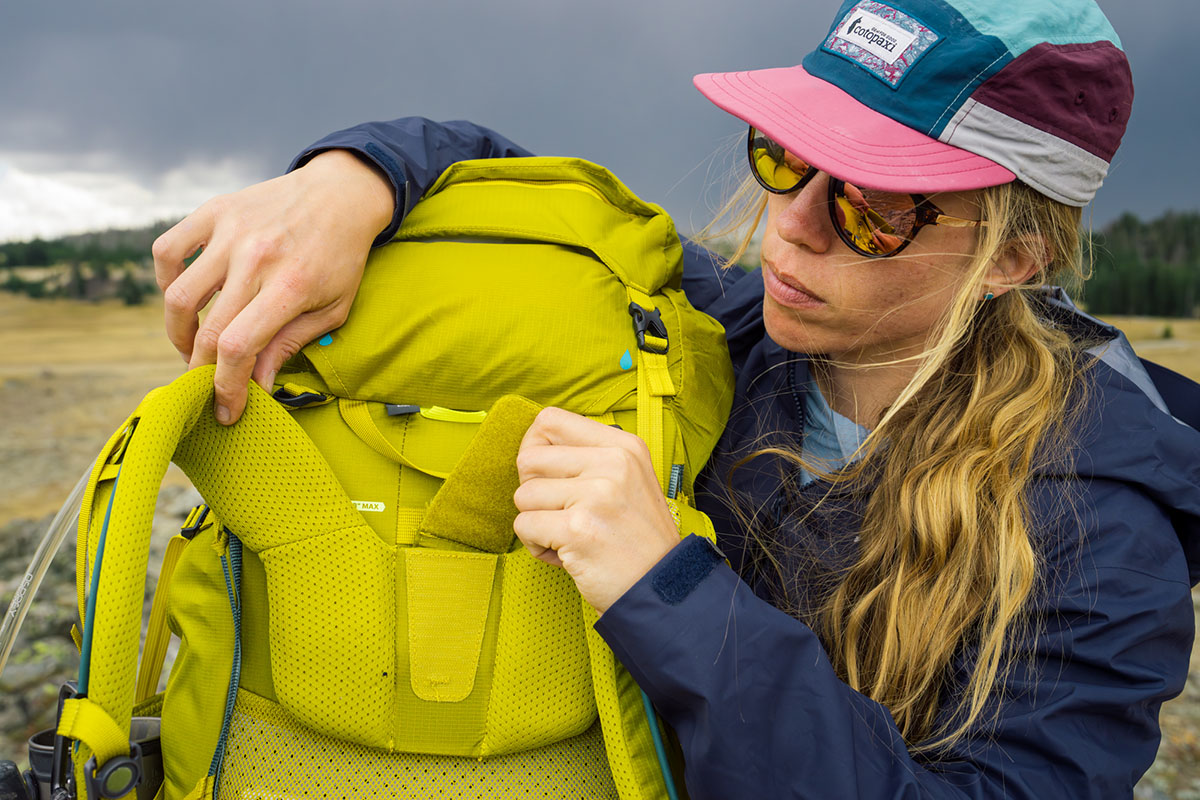
| Pack | Price | Weight | Fabric | Capacities | Load Limit |
|---|---|---|---|---|---|
| REI Co-op Flash 55 | $199 | 2 lb. 11.0 oz. | Ripstop nylon | 55L | 35 lb. |
| REI Co-op Flash Air 50 | $299 | 1 lb. 13.0 oz. | UHMWPE ripstop nylon | 50L | 25 lb. |
| Hyperlite Southwest 55 | $379 | 1 lb. 15.7 oz. | DCH (50D) | 40, 55, 70L | 40 lb. |
| Osprey Eja 58 | $260 | 2 lb. 11.5 oz. | Ripstop nylon (100D) | 38, 48, 58L | 35 lb. |
REI’s Flash 55 is a competitively priced ultralight pack that offers great carrying comfort, but it’s not the lightest design available. For $100 more, REI’s own Flash Air 50 shaves off nearly a pound and retains REI’s unique Packmod system but forgoes a lid, features a non-adjustable torso, and is only rated for loads up to 25 pounds, resulting in a noticeably more compromised feel. Moving away from REI’s lineup, Hyperlite Mountain Gear’s Southwest 55 is one of the most popular UL designs on the market. It’s lighter than the Flash 55 at 1 pound 15.7 ounces, made with specialized Dyneema fabrics that are impressively tough and weather-ready, and capable of shuttling loads up to 40 pounds. Price is the biggest drawback, with the Southwest costing a steep $379 ($399 for the more durable black colorway).

A final alternative to consider is Osprey’s Eja 58, which offers comparable carrying comfort to the Flash 55 with better support than most UL competitors (including both the Flash Air 50 and Southwest 55 mentioned above). As we touched on previously, we love the Eja’s suspended mesh backpanel for promoting airflow, and we appreciate that the torso is adjustable for fine-tuning fit. The Eja will run you around $60 more than the Flash 55 while sacrificing some organization, but those who run warm may find those trade-offs worth the bump in ventilation.
Back to the REI Women's Flash 55 Review See Our Women's Backpacking Packs Guide